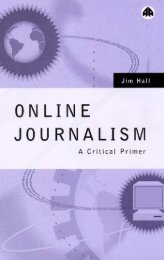Modul Mata Kuliah Journalisme Online - Ayo Menulis FISIP UAJY
Modul Mata Kuliah Journalisme Online - Ayo Menulis FISIP UAJY
Modul Mata Kuliah Journalisme Online - Ayo Menulis FISIP UAJY
You also want an ePaper? Increase the reach of your titles
YUMPU automatically turns print PDFs into web optimized ePapers that Google loves.
form (an actual quote or a similar link), then I would say you do need some balance. Again, context<br />
is key.<br />
Should we allow readers to post links in comment areas, blogs provided to readers by the site, live<br />
discussions, etc.?<br />
Brew: Yes, it's a crucial part of the debate. To allow a Web debate but then forbid participants from<br />
citing the Web seems weird. If someone abuses such a policy (or any policy), delete him/her.<br />
Deggans: Yes, because anything that gives users the ability to help make media on your site will<br />
probably attract users. That does mean a moderator or someone will have to check the links to<br />
make sure they don't refer people to porn sites or something. You can also encourage users to<br />
police themselves by reporting broken or troublesome links to you.<br />
Cox: Do you mean actual hyperlinks? In that case, I would not recommend allowing commenters to<br />
post links. The same code used to display a hyperlink can be used to display audio, video or images.<br />
My experience is that allowing commenters to place links into a site is an invitation to finding vile,<br />
outrageous images and video on your site.<br />
If you mean text indicating how to get to a particular page, I am not sure how you are going to stop<br />
that. If readers can comment, they can describe a URL. I think you just address this under "terms<br />
and conditions." You treat the Web page they have "linked" as if the commenters wrote it<br />
themselves.<br />
What I do know from personal experience is that there are two kinds of Web sites: those that have<br />
been infested with vile, foul-mouthed, disgusting trolls and those that will be. If you don't address<br />
this up front, you are guaranteed to have a problem.<br />
I was on a panel this week at RTNDA. A woman from Pappas Telecasting was there talking about<br />
how they have never had a problem with their users uploading problematic content to any of their<br />
television stations' Web sites. I just had to laugh when she said it. Talk about naive. What worries<br />
me about things like that goes back to what happened at Tribune. After their wiki debacle, they did<br />
not just take down the Los Angeles Times wiki but "froze" all citizen journalism initiatives at all of<br />
their newspapers and TV stations. That has since been lifted, but just shows that the real risk here,<br />
from my perspective with the Media Bloggers Association, is that big media outlets will try blogging<br />
and CJ, not put in proper safeguards, have it blow up in their faces and give up, saying, "Well, we<br />
tried that and it did not work."<br />
Do we tell posters they must provide an explanation or description of material linked to as warning to<br />
other users?<br />
Donosky: I think we can ask users to characterize the material they are linking to as a warning. In<br />
restrospect, I probably should not have made the decision recently to take down a link a commenter<br />
posted of an Iraqi with his head blown apart. The photo was germane to the discussion about the war,<br />
and the commenter warned it was a "graphic photo."
















